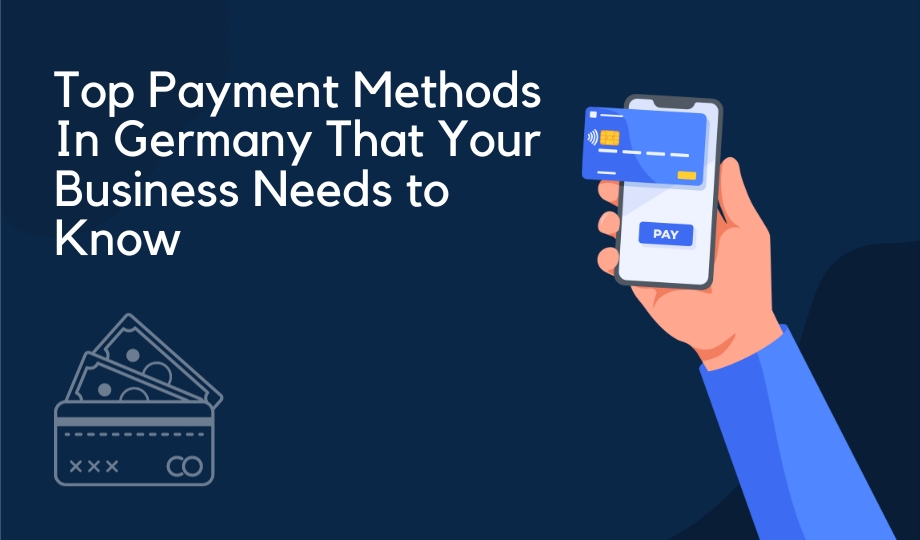Germany, as a European nation, has traditionally favored cash transactions, with cash accounting for approximately 51% of financial transactions until 2020. Local vendors and merchants’ preference for cash sales played a significant role in this high cash dependency. However, despite this reliance on cash, Germany remains one of the top 10 most profitable e-commerce markets globally, with the German payments market projected to grow at a CAGR of 12.32% from 2022 to 2027.
The landscape is changing as more German vendors are transitioning to digital payments to reduce cash dependency. The pandemic accelerated this shift, coupled with increased internet penetration, making digital payment methods increasingly prevalent.
To fully embrace the culture of digital payments, businesses in Germany must prepare for the technological shift by enabling credit card processors and alternative payment methods. This trend is reshaping the economy, with new card terminals, contactless cards, mobile payments, and cashless ticketing options emerging.
According to a recent survey by Rapyd, a prominent European payment platform, 32% of Germans use computers, and 31% shop via mobile devices.
Top 4 Payment Methods in Germany
While cash remains the preferred choice for German consumers, there is a growing demand for alternative payment methods, including credit and debit cards, digital and mobile wallets, and paying on account.
Credit Cards
Credit card usage in Germany is relatively low, with only 0.52 cards per capita, largely due to internet constraints. Credit cards account for only 13% of the market share, influenced by conservative shopping habits and debt aversion.
Notable credit card brands include VISA, Mastercard, American Express, and RuPay.
Despite these limitations, the German cards market was worth $478.80 billion in 2022, with a projected CAGR of 5% from 2022 to 2026.
Digital/Mobile Wallets
Mobile-based transactions make up approximately 21% of retail transactions in Germany.
PayPal is the preferred payment platform for 54% of Germans, making it a top choice.
Mobile transactions account for 27% of online sales in Germany, resulting in a €19.7 billion mobile commerce market.
Despite some reservations about digital payments, Germans prefer using this method for online transactions.
Debit Cards
Debit cards are widely used in Germany, with the Girocard being the equivalent of a debit card.
Girocard promotes cashless payments in Germany and other European countries, with Maestro and V-Pay options enabling international transactions.
In 2022, Girocard recorded 6.7 billion transactions, marking a 13% increase over 2021 volumes.
Contactless payments accounted for 64% of all Girocard transactions in the first half of 2021.
Digital debit card companies like N26 and Vivid Money offer convenient alternatives.
Open Invoice
Open Invoice, also known as purchase on account, remains a preferred payment method in Germany.
This method conceals sensitive payment data on a merchant’s website, ensuring consumer security.
Customers have the flexibility to try products or services before making payments within 14-28 days.
It offers a secure and convenient option that doesn’t require upfront payments or divulgence of personal payment details.
Local Payment Methods and Challenges for Businesses
Germany’s evolving payment method trends create opportunities and challenges for businesses. Meeting diverse consumer demands requires a strategic approach to payment method adoption.
Challenges include managing transaction charges, refund costs, and rental service expenses associated with multiple payment methods. However, supporting multiple payment options can lead to higher conversion rates.
Additionally, businesses must address concerns about securely implementing these payment methods amid growing cybersecurity threats, such as phishing, device compromise, system breaches, and identity theft.
How Web Technology Expert Simplifies German Payment Methods Integration
Web Technology Expert offers a unique payment method aggregation solution with access to over 300 international payment methods. Our platform supports customers from different regions, allowing payments in native currencies and preferred payment methods.
Web Technology Expert is suitable for both large-scale international enterprises and small businesses with minimal technical expertise. With Web Technology Expert, businesses can benefit from:
- Low-code/no-code payment method integration.
- A unified payment system providing a personalized transaction experience for customers.
- PCI-DSS and GDPR-compliant services for data security and regulatory compliance.
- A dashboard for end-to-end sales monitoring and analytics.
By embracing Web Technology Expert, businesses can achieve data-driven improvements in conversions and revenues.

